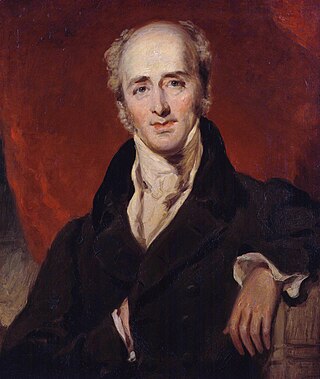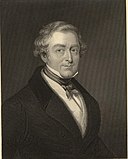
The 1852 United Kingdom general election was a watershed in the formation of the modern political parties of Britain. Following 1852, the Tory/Conservative party became, more completely, the party of the rural aristocracy, while the Whig/Liberal party became the party of the rising urban bourgeoisie in Britain. The results of the election were extremely close in terms of the numbers of seats won by the two main parties.

The 1847 United Kingdom general election was conducted between 29 July 1847 and 26 August 1847 and resulted in the Whigs in control of government despite candidates calling themselves Conservatives winning the most seats. The Conservatives were divided between Protectionists, led by Lord Stanley, and a minority of free-trade Tories, known also as Liberal Conservatives or the Peelites for their leader, former prime minister Sir Robert Peel. This left the Whigs, led by Prime Minister Lord John Russell, in a position to continue in government.

The 1835 United Kingdom general election was called when Parliament was dissolved on 29 December 1834. Polling took place between 6 January and 6 February 1835, and the results saw Robert Peel's Conservatives make large gains from their low of the 1832 election, but the Whigs maintained a large majority.

The 1832 United Kingdom general election, the first after the Reform Act, saw the Whigs win an overall majority of 224 seats, with the Tories winning less than 30% of the vote.

The 1830 United Kingdom general election was triggered by the death of King George IV and produced the first parliament of the reign of his successor, King William IV. Fought in the aftermath of the Swing Riots, it saw electoral reform become a major election issue. Polling took place in July and August and the Tories won a plurality over the Whigs, but division among Tory MPs allowed Earl Grey to form an effective government and take the question of electoral reform to the country the following year.

The Repeal Association was an Irish mass membership political movement set up by Daniel O'Connell in 1830 to campaign for a repeal of the Acts of Union of 1800 between Great Britain and Ireland.

The 1826 United Kingdom general election saw the Tories under the Earl of Liverpool win a substantial and increased majority over the Whigs. In Ireland, liberal Protestant candidates favouring Catholic emancipation, backed by the Catholic Association, achieved significant gains.

Henry Grattan was an Irish politician, who was Member of Parliament for Dublin City on behalf of the Whigs from 1826 to 1830 in the British House of Commons. From 1831 to 1852, he represented Meath for the Repeal Association.
Cork City was a parliamentary constituency in Ireland, represented in the Parliament of the United Kingdom. From 1880 to 1922 it returned two members of parliament (MPs) to the House of Commons of the United Kingdom of Great Britain and Ireland. From 1922 it was not represented in the UK Parliament, as it was no longer in the UK.
The Irish Confederation was an Irish nationalist independence movement, established on 13 January 1847 by members of the Young Ireland movement who had seceded from Daniel O'Connell's Repeal Association. Historian T. W. Moody described it as "the official organisation of Young Ireland".
John O'Connell was one of seven children of the Irish Nationalist leader Daniel O'Connell and his wife Mary. He followed his father as a Member of Parliament and leader of the Repeal Association.
Robert Keating was an Irish politician from Cashel in County Tipperary.
Daniel (Dan) Callaghan (1786–1849) was a prominent businessman and Irish politician who served as MP for Cork City from 1830 to 1849. As a member of the Repeal Association, Dan Callaghan sought to end the Act of Union (1800), which created the United Kingdom of Great Britain and Ireland. Callaghan, along with other Irish MP's like Daniel O' Connell, opposed the introduction of the Poor Laws (Ireland), which established the Victorian workhouses to Ireland.
Anthony O'Flaherty was an Irish Whig, Independent Irish Party and Repeal Association politician.
William Henry Magan was an Irish Whig, Independent Irish Party and Repeal Association politician.
John Thomas Devereux was an Irish Whig, Independent Irish Party and Repeal Association politician.
Luke White (jr.) was an Irish politician.
Samuel White was an Irish Whig politician.
Caleb Powell was an Irish Repeal Association and Whig politician.
Hamilton Knox Grogan Morgan, known as Hamilton Knox Grogan until 1828, was an Irish Whig, Repeal Association and Conservative politician.









